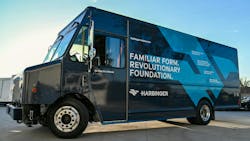EV startup CEO believes his trucks can beat out Ford, Freightliner
Harbinger is an EV startup with a focus on medium-duty stripped chassis. Harbinger believes it’s got the product to beat the competition—specifically Ford and Freightliner, according to the company’s CEO John Harris.
“Outcompeting the EV companies in our segment is not hard because they aren’t viable businesses,” Harris told FleetOwner. “We’re here to compete with Ford and Freightliner on gas and diesel products ... on performance, on driver comfort, on acquisition price—across the board.”
Can Harbinger do it?
Better engineers = better price point
Harbinger's latest milestones
- Recently raised $100 million in Series B funds for a total of $200 million raised since its inception in 2021
- An order book of 4,690 vehicle orders, valued at approximately $500 million orders from Bimbo Bakeries USA and Thor Industries
- Harbinger has closed two up-rounds during an extended down-market period, including its successful $73 million Series A funding round that closed in 2023
Beating out legacy OEMs in any commercial segment is a tall order. It hasn’t been done before. And that’s assuming Harbinger sustains itself long enough to make it to full production—a hurdle very few EV startups have overcome.
But let’s pretend the startup has a straight and probable path to production—how can it possibly beat out the likes of Ford and Freightliner?
Harbinger claims its Class 5 stripped chassis will be sold at a price comparable to diesel- and gas-powered vehicles, taking advantage of only the Inflation Reduction Act tax credit and no state or federal incentives. Harris said the company will do this based on its engineering and production strategies.
“Harbinger is the commodity buyer buying battery cells,” Harris explained. “We buy cells from a cell manufacturer, and then we do everything else in-house. When we look at battery packs on every other electric truck ... people are either buying battery packs from Catl ... or they're buying a battery pack from Proterra.”
The problem with buying battery packs as opposed to battery cells and building the packs in-house is the overhead costs, Harris said. When OEMs purchase battery packs, “they're buying something more complex with more ... engineering and more margins.”
Purchasing the battery packs and essentially using a “middleman” is “happening in electrification to a much larger extent than it has happened in traditional combustion vehicles,” Harris said, “because legacy auto companies don’t have any of the right engineering knowledge to build those electrification components.”
How does Harbinger get the engineers that Ford, Freightliner, and other legacy OEMs can’t?
See the complete story on FleetOwner.com.
About the Author

Jade Brasher
Senior Editor Jade Brasher has covered vocational trucking and fleets for the past five years. A graduate of The University of Alabama with a degree in journalism, Jade enjoys telling stories about the people behind the wheel and the intricate processes of the ever-evolving trucking industry.
